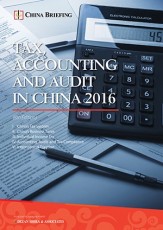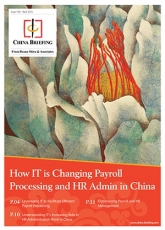China Regulatory Brief: Peer-To-Peer Lending Companies and Property Tax
Preferential Tax Policies for Import of Products for Animation Enterprises
On August 1, 2016, a notice was issued which stipulates that imported materials and equipment required for the independent development and production of animation enterprises may be exempt from import tariffs and VAT. The notice (Cai Guan Shui [2016] No.36), which was jointly issued by the Ministry of Finance (MOF), General Administration of Customs (GAC), and State Administration of Taxation (SAT), specifies that only goods which are recognized by the relevant regulatory departments may enjoy tax and tariff exemption, and so developed an interim provision bringing into effect the preferential law.
Regulation Formulated to Standardize Peer-To-Peer Lending Companies
A new regulation was issued on August 24, 2016 which will toughen control over peer-to-peer lending companies. The regulation will lead a crackdown on illegal fundraising that sometimes occur on such lending platforms. In addition, the China Banking Regulatory Commission issued a negative list which outlines the business boundaries of peer-to-peer lending companies, restricting them from activities such as cash pooling, absorbing public savings, and providing guarantees for borrowers. The regulation specifies that individual borrowers’ balance is not to exceed RMB 200,000 on a single peer-to-peer lending platform, and RMB 1 million across multiple platforms. For legal entities, these figures stand at RMB 1 million on a single platform, and RMB 5 million on multiple. Peer-to-peer platforms are also required by the regulation to manage clients’ deposited money via qualified banking institutions.
 RELATED: Tax and Compliance Services from Dezan Shira & Associates
RELATED: Tax and Compliance Services from Dezan Shira & Associates
Property Tax Reform Hinted as China’s Next Priority
China’s Finance Minister Lou Jiwei has indicated that a property tax will be introduced in the coming years, which will serve to cool down the real estate market by reducing demand and stabilizing property prices, and will ensure more even income distribution. The tax is expected to be introduced at the earliest around the end of 2017, but may take between three to five years to properly implement because of the many obstacles and challenges it will face. The State Council announced the introduction of the new property tax structure in its fiscal policy plans released earlier this year. The way it will be implemented will vary from region to region, depending on local conditions.
MOFCOM to Cancel Approval of Processing Trade Business across China
An announcement was released on August 25, 2016 which will cancel the need for approval of processing trade business across China. It will also implement and improve the regulatory mechanism responsible for procedures before and after business transactions. Approval of the processing trade contract and domestic sales of bonded imported materials for processing trade or finished products by the department in charge of commerce are to be cancelled. Enterprises engaged in the processing trade business are required to go to the Customs to complete the processing trade manual (account book) procedures by providing relevant certificates within the valid period as issued by the competent department in charge of commerce. However, Customs will no longer be in charge of verifying the relevant licensing certificates. The announcement ([2016] No.45), which will come into effect as of September 1, 2016, was jointly released by the Ministry of Commerce (MOFCOM) and the General Administration of Customs (GAC).
|
Asia Briefing Ltd. is a subsidiary of Dezan Shira & Associates. Dezan Shira is a specialist foreign direct investment practice, providing corporate establishment, business advisory, tax advisory and compliance, accounting, payroll, due diligence and financial review services to multinationals investing in China, Hong Kong, India, Vietnam, Singapore and the rest of ASEAN. For further information, please email china@dezshira.com or visit www.dezshira.com. Stay up to date with the latest business and investment trends in Asia by subscribing to our complimentary update service featuring news, commentary and regulatory insight. |

 Tax, Accounting, and Audit in China 2016
Tax, Accounting, and Audit in China 2016
This edition of Tax, Accounting, and Audit in China, updated for 2016, offers a comprehensive overview of the major taxes that foreign investors are likely to encounter when establishing or operating a business in China, as well as other tax-relevant obligations. This concise, detailed, yet pragmatic guide is ideal for CFOs, compliance officers and heads of accounting who must navigate the complex tax and accounting landscape in China in order to effectively manage and strategically plan their China-based operations.
 How IT is Changing Payroll Processing and HR Admin in China
How IT is Changing Payroll Processing and HR Admin in China
In this edition of China Briefing magazine, we examine how foreign multinationals can take better advantage of IT in the gathering, storing, and analyzing of HR information in China. We look at how IT can help foreign companies navigate China’s nuanced payroll processing regulations, explain how software platforms are becoming essential for HR, and finally answer questions on the efficacy of outsourcing payroll and HR in China.
China Investment Roadmap: the Commercial Real Estate Sector
In this issue of China Briefing, we explore the latest trends in commercial real estate in China, and discuss how foreign companies can benefit from China’s massive construction boom. We provide a guide to how firms can sell construction materials in China, and finally detail how foreign architects can most effectively enter and take advantage of China’s rapid urbanization.
- Previous Article Registered Capital, Company Loans, and the Timely Repatriation of Profits for WFOEs in China
- Next Article Options Disponibles Lors de la Restructuration d’une Entreprise en Chine











